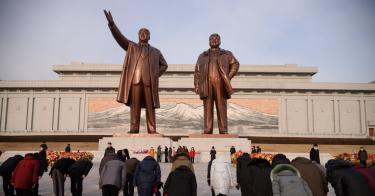Korea watchers are anxiously awaiting both the Biden administration finishing its North Korea policy review and Pyongyang conducting its next provocation. Impatience with the former and fear of the latter have led experts to advocate for measures buying Pyongyang's continued inertia against committing further violations of U.N. resolutions.
Low-end recommendations call for announcing U.S. eagerness to resume dialogue while counseling Kim Jong-un to refrain from nuclear or long-range missile tests. More grandiose proposals include economic, security and diplomatic benefits as a catalyst to opening negotiations, as well as abandoning denuclearization as a goal.
For decades, "what does North Korea want?" has been a common lament. Pyongyang's reticence to define what would induce it to reduce its arsenals led Washington, Seoul and others to proffer perks during negotiations and even as an enticement to "improve the atmosphere" to induce Pyongyang back to the table.
>>> North Korea Could Spell Trouble for Biden
Over the years, the United States and the international community have provided North Korea with security guarantees, the curtailment of military exercises and a reduction of allied deterrence, large-scale economic benefits and humanitarian assistance. They have also overlooked human rights abuses, violations of U.N. resolutions and U.S. laws. They have even reduced sanctions—all to no avail. Pyongyang continued to build its nuclear and missile forces.
At various times, North Korea proclaimed that lack of a peace treaty, security guarantees, sanctions relief and curtailment of allied military exercises was each the single biggest impediment to denuclearization, only to dismiss their importance later.
During the last working-level U.S.-North Korean diplomatic meetings in October 2019, regime diplomats refused to even define what they meant by denuclearization, security guarantee or peace declaration. Since then, Pyongyang has refused repeated U.S. and South Korean entreaties for dialogue.
In the absence of negotiations with North Korea, a current debate among Korea experts is whether to abandon denuclearization in favor of arms control or threat reduction. That is a discussion we should continue to have in order to refine U.S. policy. But some depictions of positions are inaccurate and might obscure more policy overlap than may initially appear.
"Denuclearization" has been depicted as being only the Donald Trump administration's "Libya Model" in which the United States wouldn't provide a single benefit until the entirety of North Korea's nuclear and missile facilities and arsenals were totally destroyed. Moreover, by this characterization, the entire process was to be concluded within 12 to 18 months.
But denuclearization as an end goal, as required in U.N. resolutions, can be implemented in the manner of arms control negotiations with the Soviet Union—incrementally, based on reciprocal actions by all parties, and over a period of years.
Abandoning denuclearization in favor of a "limit and freeze" policy ignores that the latter did not work when North Korea signed the Nonproliferation Treaty, International Atomic Energy Agency safeguards and inter-Korean nuclear deal. Furthermore, the "incremental steps" deal was also tried with the Agreed Framework, three different iterations of Six Party Talks statements and the Leap Day deal.
Walking away from denuclearization as a goal because "North Korea will never do it" is to acknowledge that the regime's previous pledges in numerous agreements were shams, including Kim Jong-un's denuclearization vow in the Singapore summit statement. If that is the case, why should we trust its signature on a partial arms control agreement?
>>> Biden Administration Must Address Daunting North Korea Challenge
Another straw man is that "sanctions alone won't solve the North Korean nuclear problem." Sanctions were never meant to be the only policy option. Sanctions serve a number of objectives besides altering North Korean behavior. Some uphold U.S. laws against criminal activity or human rights violations. To abandon all sanctions against North Korea would be to give Pyongyang exemption from some U.S. laws. On the other hand, U.N. sanctions which impose restrictions on North Korean economic activities are more conducive to being negotiated away during nuclear negotiations in return for North Korean actions.
Those who argue against sanctions often impose a higher standard of success for sanctions than on diplomacy. If sanctions haven't worked in preventing North Korea from expanding its nuclear arsenal or achieving denuclearization, how did diplomacy fare? Decades of signed agreements and countless attempts at dialogue all "failed" to the same degree as sanctions.?Sanctions and diplomacy are both tools; neither is a silver bullet. Both, along with other instruments of national power, should be part of a comprehensive strategy.
As we continue to argue over the best path forward, the biggest impediment remains North Korea's refusal to talk and unwillingness to abide by previous commitments. We should be forward-leaning in calling for dialogue and negotiations with North Korean officials, but reticent to offer benefits just to get them into the room.
This piece originally appeared in The Korea Times



